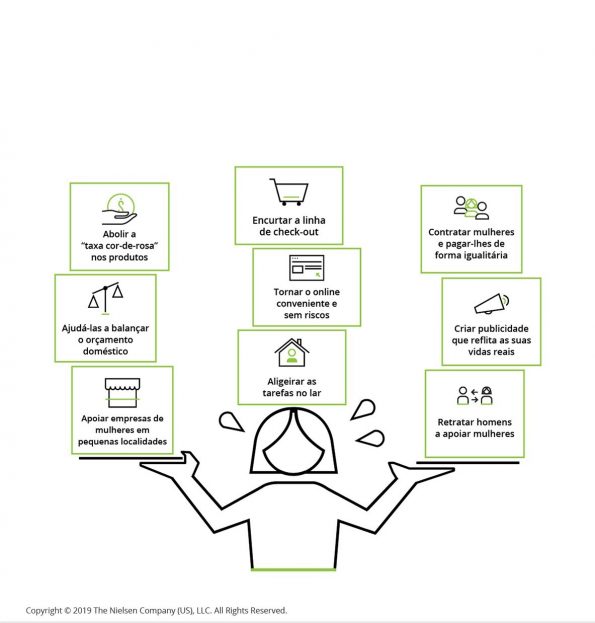European women still feel gender inequality
-
91% of European women are responsible for household chores and shopping
-
Lack of time and the value placed on leisure activities have an impact on the way women shop and give importance to convenience
-
Brands and retailers must keep up with changing cultural perceptions and needs
Lisbon, March 2020 - A global report by Nielsen reveals that European women still feel gender inequality and are increasingly seeking balance in their daily responsibilities. Although Western Europe is one of the regions where the achievements of gender parity are most evident, women still experience inequality at work, financially and at home. The reality is that women continue to take on the lion's share of domestic responsibilities, and on average 91% of them claim to have shared or total responsibility for daily shopping, household chores and meal preparation.

This means that women are also the main buyers of household products. Taking on this second, and sometimes third, "job" means that women have additional demands and less time to meet them, and turns this group into one of the biggest opportunities for a convenience-oriented offer.
What are women looking for when it comes to consumption?
With increasingly busy and full lives, women value the time they spend on leisure and entertainment activities. Outside the workplace, they are looking for ways to recover what they consider most important - have more timeThis usually means reducing the time spent on daily tasks.
Across Europe, 60% of women say that a convenient store location is a highly influential factor in deciding where to shop, compared to 52% of men. As Ana Paula Barbosa, Retailer Vertical Director at Nielsen, explains, "With less time available and a greater interest in occupying it with leisure activities, women are looking for ways to maximize efficiency, preferring stores that offer a quick shopping experience. They also prefer efficiently organized stores and time-saving services."
European women are more likely to make online purchases that are risk-free and convenient. As an example, fast and free delivery for online purchases particularly appeals to 45% of European women, compared to 35% of men, making this the region with the biggest gender gap for this type of service. European women are also more likely to be interested in receiving notifications when an item is out of stock or when products are sold with the possibility of return.
Despite work and time pressures, women are focused on living healthier lives and are not willing to compromise on their health, which is a top priority for women in Europe, North America and Asia-Pacific. European female consumers are more likely to analyze the products on the shelf than men. They are looking for transparent labels and for companies to be open about where their products come from and how they are produced. In this battle of the brands, those that prioritize health and quality ingredients have the upper hand.
What does all this mean for manufacturers and retailers?
The shift in gender paradigms is moving from a minority to normality, especially in markets dominated by Millennial consumers of working age. However, gender disparity is still common in modern advertising, and both men and women are aware of this reality. Stereotypes that might have been acceptable a few years ago now provoke some indignation, with negative consequences for brands or banners. Although cultural norms vary globally, it is essential to communicate the important role that men play in the emancipation of women and on this path to equality - from encouraging and defending inclusion in the workplace to sharing household chores.

As Ana Paula Barbosa explains, "brands that follow this trend, whether through initiatives promoting social responsibility, health or convenience, will continue to win over consumers. This type of strategy depends on a true understanding of women's needs and reflects their reality on the screens, on the shelves and in the store. It's not just beneficial for business, it's the only choice. By focusing on supporting women's needs, companies will be able to contribute to the development of this powerful group that dominates household spending."
Additional information on the Nielsen study available here.
—
About Nielsen
Nielsen Holdings plc (NYSE: NLSN) is a global measurement management and data analytics company that provides the most complete and reliable insight into markets and consumers around the world. Nielsen brings together its own data with data from other sources to help its clients around the world understand what is happening now and what will happen in the future, and how best to use that knowledge. For more than 90 years, Nielsen has been providing innovative, scientifically rigorous data and analysis, and continues to develop new ways of answering the most important questions facing the media industries. mediaadvertising, retail and FMCG are currently facing. Nielsen, a Standard & Poors 500 company, is present in more than 100 countries, representing more than 90 percent of the world's population. For more information, visit www.nielsen.com.
Contact details of Press Office
Say U Consulting

